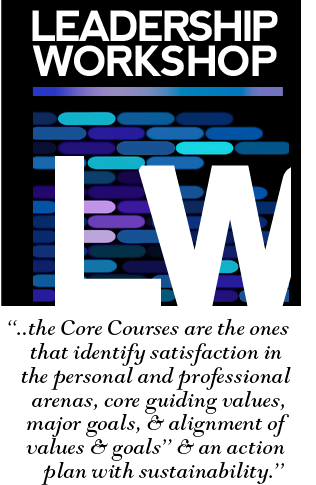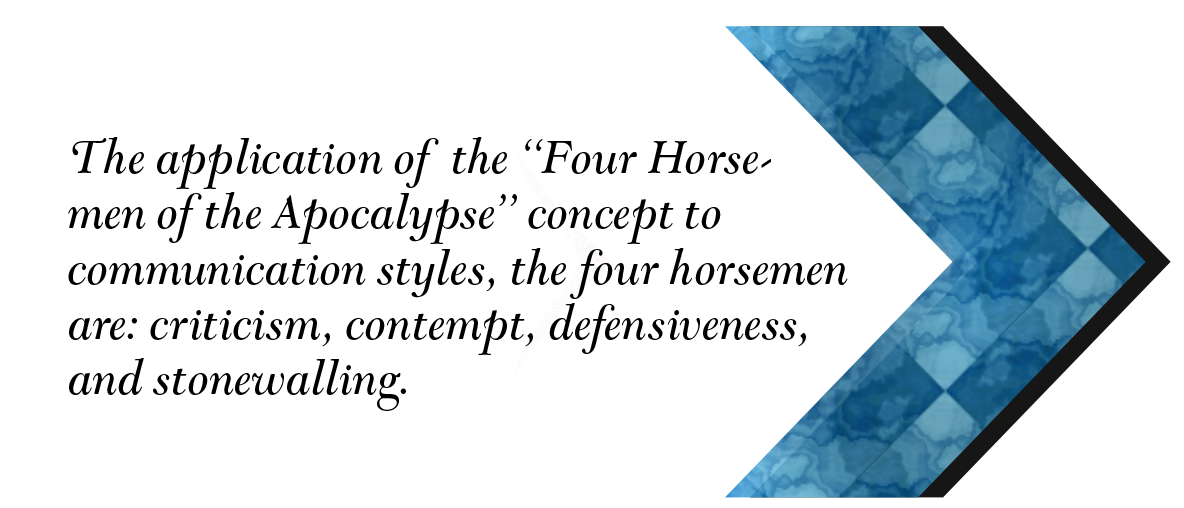Leadership Workshops
 Lead Your Life Now!
Lead Your Life Now!
We offer a variety of workshops that can be provided in person or on-site.
The Core Course
Consists of one full day on-site workshop which will cover: exercises to determine current level of satisfaction in the personal and professional arenas, core guiding values, major goals, alignment of values and goals, and an action plan with a sustainability component.
Leading with intention will also be discussed as well as the importance of an accountability plan to monitor the action plan for sustained change. We will also identify your personal challenges and learn powerful skills to deal with them. At the end of the day you will understand your personal leadership and have a plan to become your biggest, best, possible self!
The exercises that follow are all highly experiential and reflective:
- Reflective questioning and exercises to determine core guiding values and alignment
- Exercises to determine the “box” we carry on our back that inhibits our leadership abilities.
- Exercises to determine and diffuse the default communication mode we revert to when in conflict
- Exercises to illuminate our own privileges
The end product is a very tight action plan with a sustainability component for value-laden leadership alignment.
Team Toxins: Apocalyptic Destructive Communication Styles:
 Dr. John Gottman of The University of Washington applied the “Four Horsemen of the Apocalypse” concept to communication styles. The four horsemen are: criticism, contempt, defensiveness, and stonewalling. He studied married couples and could accurately predict divorce 96% of the time within 3 minutes by noting which of the 4 horsemen they resorted to when in conflict. So, what does this research have to do with personal leadership? Well, it is beginning to appear that one’s “default horseman” comes into play outside of intimate personal relationships and is present when one is working with a team, a family member, or just about anyone that you may wind up in conflict.
Dr. John Gottman of The University of Washington applied the “Four Horsemen of the Apocalypse” concept to communication styles. The four horsemen are: criticism, contempt, defensiveness, and stonewalling. He studied married couples and could accurately predict divorce 96% of the time within 3 minutes by noting which of the 4 horsemen they resorted to when in conflict. So, what does this research have to do with personal leadership? Well, it is beginning to appear that one’s “default horseman” comes into play outside of intimate personal relationships and is present when one is working with a team, a family member, or just about anyone that you may wind up in conflict.
In this training we will:
- Teach participants about the four horsemen (the four team toxicities)
- Assist participants with finding their own “default horseman” in terms of conflict engagement
- Learn about why we engage in the toxic behavior that we do (in other words, what are the benefits)
- Learn about how to diffuse ourselves and others when the horsemen show up in conflict.
Exploring Dimensions of Values-Based Personal Leadership
This workshop is intended to launch you on a personal journey to help define yourself as a values-based leader. What does values-based leadership mean to you? How is it you can live it in a way that helps you achieve your personal as well as career goals?
It begins with a look at “What Leaders Do” – their role in today’s organization that is defined as a consequence of your position and status within the organization. How does values-based leadership look in the workplace today?
The second module, “How Leaders Are” focuses on what is it that differentiates in our mind those who are exemplary values-based leaders from those who are not.
The next class will also invite clients to contemplate “How You Are” – how they see themselves as values-based leaders and the degree to which this is aligned with their personal values and beliefs.
Finally we will ask them to consider “What You Do”; how their personal leadership statements can translate into their deliberate values-based actions and behaviors on the job that achieve influence.
Clients will learn:
- Whether they have reactive or creative leadership tendencies from The Leadership Circle Profile 360, which measures underlying values and beliefs that determine values-based leadership behavior (www.TheLeadershipCircle.com)
- How they can move from reactive to creative values-based leadership.
- To create a meaningful, tangible, action plan with a sustainability component for values-based leadership goals.
- How they can begin to define themselves as values-based leaders, considering who is the “customer” of their own leadership
These communication skills are applicable to students' intimate relationships, friends, families, teams and organizations, job settings, as well as local and global communities.
